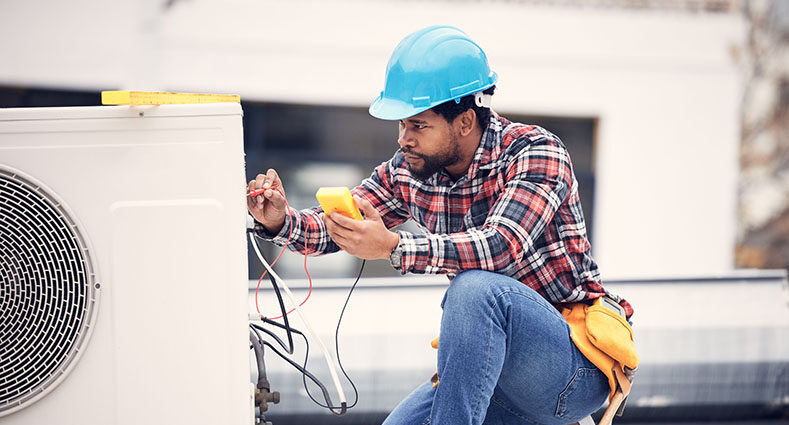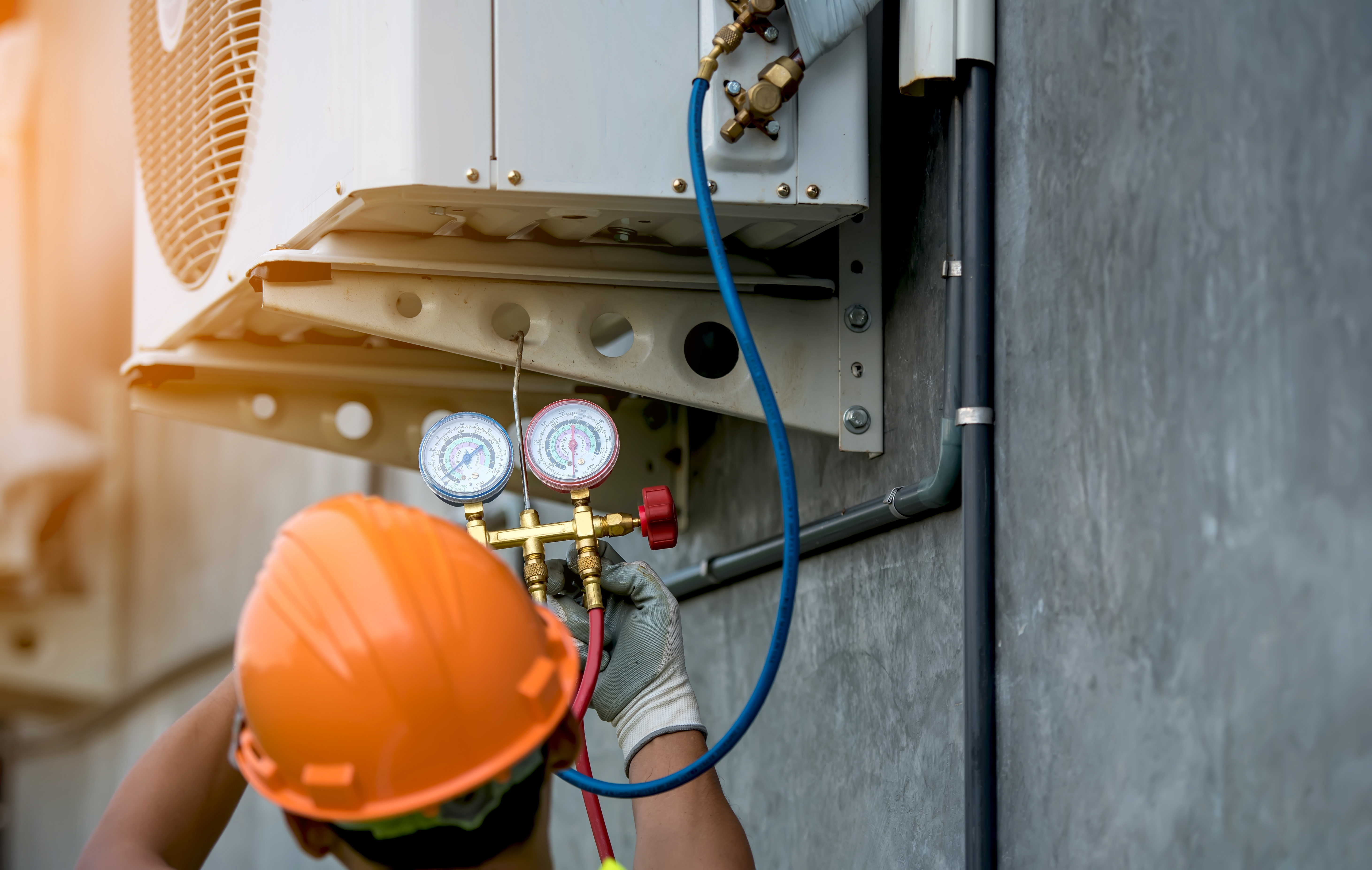All About HVAC: Identifying Common Issues and Effective AC Repair Techniques
Cooling and heating systems are essential for preserving interior convenience. Understanding their elements and performance is crucial for identifying common concerns. Home owners typically deal with issues such as ineffective air conditioning, odd smells, or rising energy costs. These indications can suggest underlying issues that may call for attention. Discovering do it yourself troubleshooting methods can be valuable, yet understanding when to seek expert aid is just as important. What actions can be taken to assure lasting efficiency?
Recognizing Your Cooling And Heating System: Components and Functionality
An a/c system, often taken into consideration the foundation of indoor climate control, consists of numerous essential elements that interact to manage temperature level and air high quality. The key aspects consist of the home heating unit, air flow system, and cooling unit. The heating unit, commonly a furnace or central heating boiler, creates heat during cooler months, while the a/c device cools down indoor areas throughout the summer season.

Usual Cooling And Heating Problems Home Owners Experience
Homeowners frequently deal with numerous usual heating and cooling troubles, consisting of inconsistent temperature circulation throughout their space. Furthermore, uncommon noises during operation can show underlying issues that need attention. Addressing these issues without delay is vital for maintaining optimal system efficiency.
Inconsistent Temperature Level Circulation
Many families experience the frustrating problem of inconsistent temperature distribution, where specific rooms feel annoyingly warm while others continue to be as well cold. This trouble usually develops from a selection of factors, consisting of bad insulation, obstructed vents, or an incorrectly sized cooling and heating system. When air ducts are not effectively secured or when furnishings obstructs air movement, some rooms might obtain not enough cooling. Additionally, thermostat placement can greatly affect temperature policy; a thermostat situated in a sunlit location may misstate the overall temperature level of your home. Routine maintenance, including cleansing filters and making certain ductwork is clear, can assist minimize these inconsistencies. House owners may also take into consideration zoning systems to far better control temperature levels throughout various locations of the home, advertising a much more comfy living environment.
Unusual Noises Throughout Operation
When a cooling and heating system operates, unusual noises can show underlying concerns that need focus. Homeowners might run into a variety of noises, such as grinding, squeaking, or hissing. Grinding sounds often signify worn-out bearings or parts, while squeaking can suggest loose belts or components needing lubrication. Hissing may show a refrigerant leak, which can jeopardize the system's performance. In addition, banging sounds might point to loose ductwork or a concern with the blower fan. Each of these sounds acts as a warning, prompting home owners to explore further. Overlooking these indications can cause more significant issues and expensive repairs. Regular maintenance and punctual focus to unusual noises can improve system longevity and efficiency, making sure a comfy living environment.
Signs That Indicate Your AC Demands Repair Work
Just how can one tell if their a/c system needs repair? A number of indicators might suggest underlying problems requiring expert focus. Initially, if the AC fails to cool down the space efficiently, it might suggest a refrigerant leakage or compressor breakdown. Furthermore, a boost in energy costs without corresponding use adjustments could indicate inadequacy in the system. Home owners should additionally be sharp to unusual smells originating from the unit, which might show mold and mildew growth or electric concerns. If the A/c often cycles on and off, it may be a sign of a damaged thermostat or other mechanical problems. The presence of water merging around the device can show a clogged drainpipe line. Acknowledging these signs early can conserve money and time, ensuring that the air conditioning system runs effectively and properly.
DIY Troubleshooting Techniques for Heating And Cooling Issues
When encountering cooling and heating concerns, house owners can use several DIY fixing strategies to determine the trouble. Trick approaches consist of checking thermostat setups, checking air filters, and reviewing drain problems. These actions can assist determine usual breakdowns before seeking expert support.
Examining Thermostat Settings
What actions should homeowners require to assure their thermostat settings are appropriate? First, they should verify the thermostat is readied to the wanted temperature and setting, whether heating or cooling. Inspecting for a clear display and confirming the thermostat is not established to "hold" or "trip" setting is essential. Homeowners ought check my blog to likewise confirm that the thermostat is level and mounted in an area totally free from drafts, direct sunshine, or other temperature level influences. Furthermore, recalibrating the thermostat can help offer precise readings. If the thermostat operates batteries, changing them might deal with any issues. By methodically reviewing these elements, home owners can often identify and correct thermostat-related troubles, promoting suitable a/c system efficiency.
Inspecting Air Filters
Air filters play an important function in maintaining perfect HVAC efficiency. They trap dirt, irritants, and various useful reference other fragments, making certain clean air blood circulation. With time, filters can come to be stopped up, reducing airflow and effectiveness. To examine air filters, people must first situate the filter, usually found in the return duct or near the heating system. As soon as situated, they need to examine the filter's condition-- if it shows up unclean or blemished, it most likely needs replacement. Many filters require altering every 1-3 months, relying on use and ecological factors. Routine assessment and prompt substitute of air filters not only improve air quality however additionally prolong the life-span of a/c systems, preventing possible breakdowns and pricey repair services.
Assessing Water Drainage Issues
How can homeowners efficiently determine and address water drainage concerns within their cooling and heating systems? Initially, they ought to evaluate the condensate drainpipe line for blockages or obstructions, which can cause water accumulation. House owners may make use of a wet/dry vacuum to get rid of any type of debris blocking the line. Next, checking the drainpipe frying pan for rust or leakages is vital, as a damaged frying pan can create water to overflow. Normal cleaning of the drainpipe line with a combination of vinegar and water assists prevent future obstructions. Additionally, guaranteeing correct incline of the drain line promotes effective water flow. If these DIY strategies do not settle the concern, getting in touch with a professional HVAC technician may be essential to stay clear of prospective water damages and system failure.
When to Call an Expert for A/c Repair Work

While some air conditioner problems can be taken care of with do it yourself methods, there are scenarios where calling a professional comes to be essential. Homeowners should seek expert help when they encounter persistent troubles, such as inadequate air conditioning, weird noises, or unusual odors emanating from the device. These signs and symptoms might show deeper problems that call for specialized expertise and tools to identify and repair appropriately.

Preventative Upkeep Tips for Cooling And Heating Durability
Regular preventative upkeep can substantially improve the durability of a/c systems. House owners should set up annual assessments by licensed technicians to evaluate system efficiency and identify prospective issues. On a regular basis changing or cleansing air filters is crucial, as this warranties appropriate air movement and reduces pressure on the system. In enhancement, examining and securing ductwork prevents energy loss and enhances total performance.
It is additionally advisable to keep the outdoor device free from debris and greenery, allowing for peak airflow and warm exchange. Homeowners need to check the condensate drainpipe for clogs to avoid water damage and mold growth. Maintaining proper thermostat settings and using programmable alternatives can boost power performance. Documenting upkeep activities assists track service history and can assist in determining reoccuring problems. By following these preventative measures, individuals can make best use of the efficiency and life expectancy of their cooling and heating systems
Frequently Asked Concerns
Exactly how Typically Should I Change My Heating And Cooling System Filters?
Cooling and heating system filters need to normally be replaced each to three months, depending upon usage, filter type, and ecological elements. Regular substitute helps preserve performance and air high quality, ensuring peak system performance throughout the year.
What Dimension Heating And Cooling System Do I Required for My Home?
To establish the appropriate heating and cooling system size for a home, one must take into consideration square footage, insulation quality, and local climate. Consulting a specialist can aid assure maximum effectiveness and comfort for the details living room.
Are There Eco-Friendly HVAC Options Available?
Yes, eco-friendly cooling and heating alternatives are offered, including energy-efficient heatpump, solar-powered systems, and geothermal home heating. These choices lower power intake and ecological influence, promoting sustainability while preserving efficient climate control for domestic and commercial spaces.
Just How Can I Boost My cooling and heating System's Energy Efficiency?
To boost heating and cooling power effectiveness, one can frequently keep the system, seal air leaks, install programmable thermostats, make use of energy-efficient filters, and guarantee ample insulation throughout the home to decrease power usage and enhance efficiency.

What Is the Typical Life Expectancy of a Cooling And Heating System?
The ordinary life-span of a HVAC system generally ranges from 15 to 25 years, depending on aspects such as upkeep, use, and the top quality of setup. Normal maintenance can significantly expand its functional durability.
Verdict
In recap, an extensive understanding of heating and cooling systems encourages home owners to identify typical issues and address minor problems efficiently. Acknowledging indications of malfunction, using do it yourself fixing techniques, and focusing on routine maintenance can enhance system efficiency and effectiveness. When encountered with complicated repair services, employing expert assistance is critical to assure safety page and security and long life. By cultivating recognition and positive care, individuals can enjoy a comfortable interior setting while decreasing unanticipated expenses connected with a/c failings.